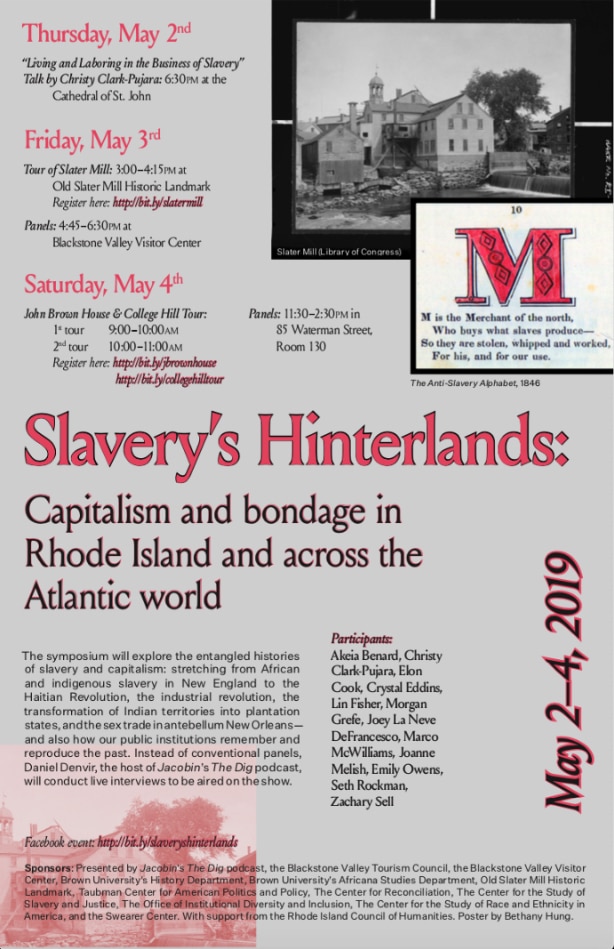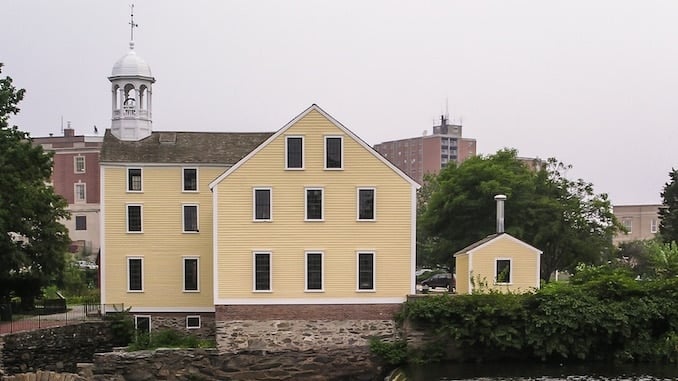Symposium to examine Rhode Island’s significant involvement in the slave trade
“Slavery’s Hinterlands” is a three-day symposium taking place May 2 – 4 at sites in Providence and Pawtucket that will gather leading academics and public historians to explore American slavery as it was: not merely the South’s “peculiar” institution but a core feature of American capitalism and empire; a critical facet of the industrial revolution, territorial expansion, and native dispossession
May 2, 2019, 9:42 am
By Uprise RI Staff
“Slavery’s Hinterlands” is a three-day symposium taking place May 2 – 4 at sites in Providence and Pawtucket that will gather leading academics and public historians to explore American slavery as it was: not merely the South’s “peculiar” institution but a core feature of American capitalism and empire; a critical facet of the industrial revolution, territorial expansion, and native dispossession that made the United States the most powerful nation on earth. The symposium compels us to rethink the geography of American slavery, not merely where it took place but also where the fruits of human bondage were reaped.
All symposium events will be free and open to the public.

“Few Americans know much about Rhode Island and few Rhode Islanders know much about our state’s history at the center of the transatlantic slave economy,” said Daniel Denvir, a fellow at Brown University’s Watson Institute and a conference organizer. “Not only did Rhode Islanders profit from the slave trade, they used those profits to fund the industrial revolution and the making of the New England working class. We can only understand why Americans are so divided today if we explore the origins of our present moment in an economic and political system that used African slave labor to build an economy that works—and continues to work—to the benefit of just a few.”
Guests include Christy Clark-Pujara, Professor of History at University of Wisconsin-Madison and the author of the award winning book Dark Work: The Business of Slavery in Rhode Island; Joanne Melish, author of Disowning Slavery: Gradual Emancipation and ‘Race’ in New England; Elon Cook, the Program Director of The Center for Reconciliation; Morgan Grefe, Executive Director of the Rhode Island Historical Society; Seth Rockman, Brown University Professor of History; local public historians Marco McWilliams, Joey La Neve DeFrancesco, and Akeia Bernard; and noted scholars Crystal Eddins, Emily Owens, Zachary Sell, and Lin Fisher.
The event will explore the entangled histories of slavery and capitalism: stretching from African and indigenous slavery in New England to the Haitian Revolution, the industrial revolution, the transformation of Indian territories into plantation states, and the sex trade in antebellum New Orleans—and also how our public institutions remember and reproduce the past. Instead of conventional panels, Daniel Denvir, the host of Jacobin’s The Dig podcast, will conduct live interviews to be aired on the show. The symposium also includes tours of Slater Mill Museum, John Brown House Museum, and Providence’s East Side.
May 3 will begin with a tour of Slater Mill museum in Pawtucket, exploring the role of slavery in the rise of industrial capitalism and the American labor movement led by Joey La Neve DeFrancesco, followed by interviews and panels at the Blackstone Valley Visitor Center. May 4 will begin with a tour of the John Brown House Museum, led by Rhode Island Historical Society Executive Director Morgan Grefe, and a walking tour of College Hill highlighting the history of slavery and black Rhode Island led by Elon Cook and Marco McWilliams, followed by further panels and interviews at Brown University.
Presented by Jacobin’s The Dig podcast, The Center for Reconciliation, and Brown University’s History Department, Taubman Center for American Politics and Policy, Center for the Study of Slavery and Justice, Demand Progress Education Fund, Center for the Study of Race and Ethnicity in America, Department of Africana Studies, Office of Institutional Equity and Diversity, Swearer Center, and the Blackstone Valley Tourism Council, Blackstone Valley Visitor Center, and Old Slater Mill National Historic Landmark. With support from the Rhode Island Council of Humanities.
[From a press release]





